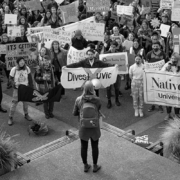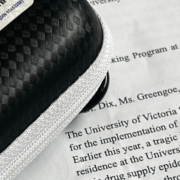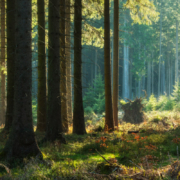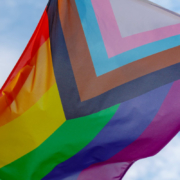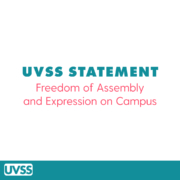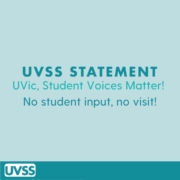New Student Welcome 2024
Thank you, Elder Terri Barnhard for your welcome and prayer
Good afternoon everyone, My name is Bunni Williams. I use they/them pronouns and I am your Director of Outreach and University Relations of the University of Victoria Students’ Society. I am from the unceded and unsurrendered territories of the Katzie, Kwantlen and Semiahmoo nations and move to the Lekwungen and Wsanec peoples land to start my education in 2019.
I remember when I moved into Sir Arthur Currie residence – the stress, the excitement, the tears. Moving away was a terrifying experience but was so thrilling. Moving away from your community to a place of education is an opportunity for a theme of beautiful learning and unlearning and what we can do when we move away from home for the first time and we experience new things and people and our understanding of life is challenged
The UVSS is a place where I was able to find my community and expand my mindset
I was met with such different opinions and some that I didn’t agree with but i found that in the disagreements I can question and then strengthen my own beliefs by learning someone else’s perspective. Isn’t that what university is supposed to be? A place to be challenged and to make mistakes.
Which I don’t think that people and also the education system honour that process of learning enough – to make mistakes. To even admit when your wrong, and that’s what I believe makes the UVSS so special.
We are a diverse collection to lead, advocate and organize on behalf of the 19,000 undergraduates here at the University of Victoria
We are a not for profit student union That is separate from the University. We are run by students for students. Our main pillars that we operate under are Social justice, environmental sustainability, decolonization, excellence in services, good governance and fun! We are a board of 22 undergraduate students across disciplines, ages, and backgrounds that are here for you. We lobby the university and the provincial government on various student issues that affect us right now- we too are students who are living in a world of crisis. The affordability crisis, the food insecurity crisis, the housing crisis, the climate crisis, sexualized and gender-based violence, the toxic drug supply in our province – we have many issues to tackle.
We fight for you, because we are you.
I invite you to explore the resources, services, campaigns, events, and programs your student union has to offer you. Not only do we provide essential services like affordable and healthy food options, your health care and dental plan and making your transit affordable and accessible through our bus pass. We also have amazing communities for you to join- we have 5 advocacy groups that represent queer voices, students of colour, indigenous students, woman and gender non confirming folks, and students with disabilities that all have physical spaces you can hang out in and unique collectives with various events that are catered to the demographics that they serve. We have over 150 clubs and course unions in various interests- which you can meet September 11th and 12th at the student union building, and we are a large employer of students in an unionized work environment.
A lot of students want to put their head down and finish your 4 years. however if you have the privilege and means to take your time. I can not recommend enough you do it. I may be biased because I have been in school coming onto 5 years and I’m almost considered a mature student but maybe that’s why you should take it from me. If you told me in first year when I was sitting where you are now that I would be making the welcoming speech in just a couple years I would think your joking. I never expected the projection of my time at UVic to land me here at this podium. But this place is an opportunity to learn, explore and network. Your professors, university administration and fellow students may be your co workers or even bosses and while you explore campus life and start your career in academia I invite you to explore what you can offer to your student union.
Because we are stronger when we are together!
I hope to see you all around the student union building and campus kick off this week, if you see me around campus please say hi! I know what it’s like to be in a new place and I’m always looking for new friends
Thank you to Kevin Hall and UVic administration for allowing student leaders – like myself to have a voice here on campus and I’m looking forward to continuing working with u this year to improve the lives of students.
In Solidarity forever,
Bunni Williams
Thank you.
